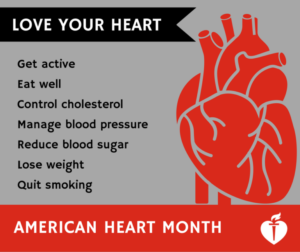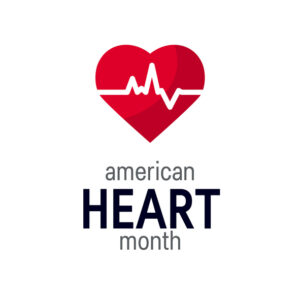

Why do we observe American Heart Month every February? Well, every year more than 600,000 Americans die from heart disease. The number one cause of deaths for most groups, heart disease affects all ages, genders, and ethnicities. Risk factors include high cholesterol, high blood pressure, smoking, diabetes, and excessive alcohol use.
Do you know how to keep your heart healthy? You can take an active role in reducing your risk for heart disease by eating a healthy diet, engaging in physical activity, and managing your cholesterol and blood pressure. This is a great chance to start some heart-healthy habits!
HISTORY OF AMERICAN HEART MONTH

The human heart is responsible for pumping blood throughout our body, supplying oxygen and nutrients and removing toxins and waste. Weighing between 8 and 12 ounces, the heart is a mighty organ divided into four chambers that work together to pump blood in and out. The heart gets oxygenated blood from the lungs and pumps it throughout the rest of the body. It does this by contracting at a rhythmic pace, about 60-80 times per minute, thanks to electrical cells called “pacemakers.” When the heart ceases to perform its regular function, a medical device also called a pacemaker can be implanted to assist the heart.
Heart disease occurs when the arteries leading to the heart become clogged. Although heart disease has been around for thousands of years, we do know that many aspects of modern life exacerbate risk factors and make people more prone to heart disease and heart failure. Today, one in four deaths in the U.S. is attributable to heart disease. Heart disease can affect everyone, but taking stock of your prior health risks, activities and diet can help you reduce your risk.
Although we’ve learned a lot about how the heart works, there are still many unanswered questions about heart health and the cardiovascular system. As far as we know, the best way to protect your heart is to stay active, eat a healthy and balanced diet, and reduce your daily stress. To celebrate American Heart Month, take some time to learn about heart health risks, find your favorite heart-healthy activities, and cook some healthy meals with your family.

Argentinian surgeon Rene Favaloro from the Cleveland Clinic performs the first bypass surgery, changing heart treatment forever. Today, coronary artery bypass grafting is the most common cardiac surgery in the world.
In the 1950s, doctors begin to understand cholesterol and the role of a low-fat diet in cardiovascular health.
Several heart disease research groups coalesce to form the AHA, hoping to coordinate and promote efforts to understand and treat heart disease.
Egyptian mummies, some more than 3,500 years old, show signs of cardiovascular disease, proving that heart disease isn’t an entirely modern phenomenon. Researchers speculate that the high-fat diet and sedentary lifestyle of upper-class Egyptians may have contributed to their poor health, but other pre-modern factors could also be at play.
5 INTERESTING FACTS ABOUT HEART HEALTH
-
Heart attacks can be silent
One in five heart attacks occurs without the person even knowing they had one.
-
Heart attacks affect women differently
Women may experience different symptoms than men. These include pain in the back, arm, neck, or shoulder; nausea; fatigue; shortness of breath; and vomiting.
-
Young women are at higher risk than men
Women under the age of 50 are twice as likely to die of a heart attack as men in the same age group.
-
Another reason to hate Mondays
Heart attacks are more likely to occur on Monday mornings than other days of the week. Scientists attribute this to the disruption in our circadian rhythm over the weekend which leads to increased blood pressure and other changes to the nervous system.
-
Diet soda raises heart attack risk
If you drink one or more diet sodas a day, your chances of having a heart attack are 43% higher than those who drink regular soda or none at all.
WHY AMERICAN HEART MONTH IS IMPORTANT
-
It reminds us to take care of our heart
American Heart Month motivates us to examine our own health habits and risks and take steps to improve our heart health.
-
It promotes education about heart health
Knowing the risk factors for heart disease and how to reduce them can help people lead healthier lives and diminish their risk for heart attacks or other cardiovascular diseases.
-
It raises awareness of heart disease
As the number one killer of Americans, heart disease is a slow-moving epidemic that affects almost everyone.

Peachy Mint Iced Green Tea

Ingredients
- 6 green tea bags
- •6 cups water
- •2 peaches, sliced
- •2 tablespoons honey
- •6 sprigs fresh mint
Instructions
1. Bring water to a boil in a sauce pan. When boiling, remove from heat.
2. After water has been removed from heat for 1-2 minutes, carefully add sliced peaches and tea bags. Let the tea bags steep for 2 minutes then remove. Allow the peach slices to steep an additional 3 minutes, then remove to a separate container.
3. Add honey to tea and finish cooling. Once cool, transfer to a pitcher or some other container, and refrigerate for a couple hours or until chilled.
4. Place ice, a few peach slices, and fresh mint in a tall glass. Pour tea into glasses and enjoy a refreshing, chilled beverage!
5. You can also leave mint sprigs and peach slices in with the tea while refrigerating, but it will continue to flavor the tea!
Notes: Nutrition information is calculated with peach slices consumed – nutrition information will vary if steeped peach slices are discarded. Substitute agave for honey to make vegan.
